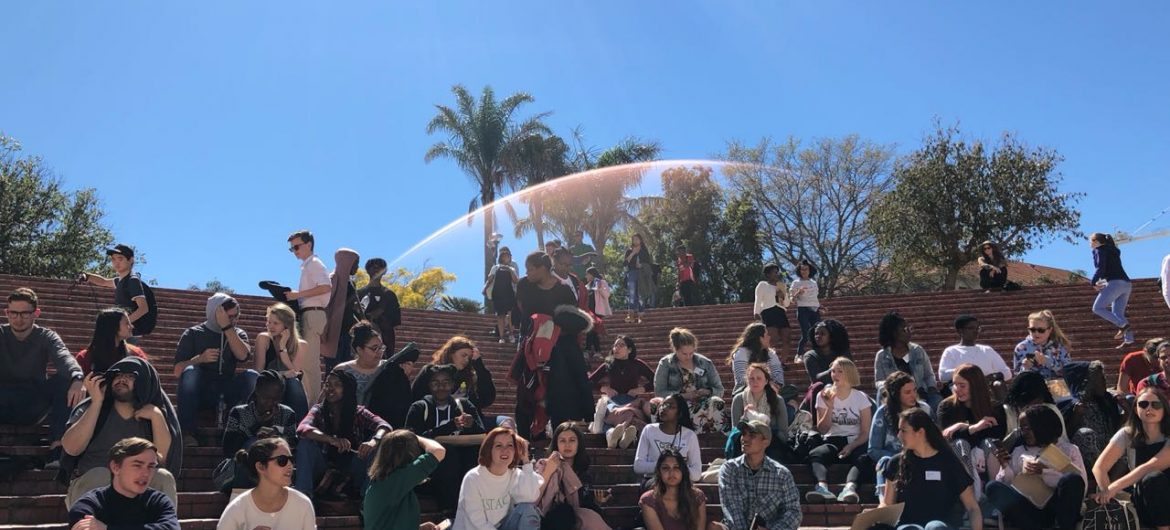TTo fully understand why I believe that the Rooiplein discussion that took place during the SULeads Conference should become the norm on the Stellenbosch University campus, I need to provide context – cue third person storytelling.
On 9 September 2018, the young and ambitious positional and non-positional leaders of Stellenbosch University congregated in Kruiskerk for what was dubbed “the beginning” of their “leadership journey”. The Frederik Van Zyl Slabbert Institute initiative is known for its controversial speakers and hard hitting topics. However, what was to be an insightful first day of intense interaction and fruitful insight fell short of expectations and landed in the space between a church service and a 9 hour long slide-driven lecture – leaving many students dissatisfied.
When morning broke on the second day of the conference, students entered Kruiskerk hungry for productive discussion, practical advise, critical engagement and intellectual discourse (something that the FVZS was not prepared for). During a “quick” debrief of the previous day’s sessions, students were slow to shower the conference with praise. Instead, students began a discussion on the productivity of engaging with fellow students, the absence of white people at critical discussions and the silencing of privileged voices at mass meetings. The conversation was scattered yet robust and much like Newton’s Third law of motion – for every contribution there was an equal and opposite contribution. This somewhat natural derailment from the schedule forced the schedule itself to be altered. Guest speakers were asked to shorten their speeches and organisers were pressed to allow time for the conversation to grow.
What was remarkable about this exchange was that students of differing political standings voiced an unambiguous desire to have a mass discussion about pertinent topics in Kruiskerk. These desires were ignored by FVZS staff, who strongly argued that a discussion of 1400 strong in a large venue would be impractical and hard to control. Discouraged by this decision, a small groups of students made a call to attendees of the conference to meet on the Rooiplein for the dialogue to continue on their terms – cue first person perspective.
I was not the one who initiated the idea of an impromptu mass meeting, this can be attributed to a group of strong women from the Serruria HK. I was basically just one of the many visibly disgruntled conference goers who spread word of the meeting.
It almost goes without saying that the Stellenbosch student experience is one that is riddled with its divisions (be it race, gender, language or religion). Students often exist within the comfort of what is familiar; never thinking to wander outside of those boundaries. This becomes blatantly obvious when external events (such as protests, policy changes or even news articles) force students to reconsider what it means to live inside a misinformed yet comfortable bubble. Often times, students feel the need to become informed on matters outside of their comfort zones once protests escalate or policies are changed (which are usually times when the tensions in the space are unavoidable). I would argue that if ever there is a time to break these divisions and get informed or critically engage it is during the quieter moments, when more individuals are willing to explain and discuss pertinent matters.
In my 4 years at Stellenbosch University I have attendented more than a handful of mass meetings; each of which were topical, frustrating, insightful and empowering. At each respective meeting (whether it be on Rape Culture, Race Relations, Fees Must Fall or the Language Policy) privileged voices are not prioritised – and rightfully so. When you’re at a place of privilege, blind spots exist when engaging with these issues and as a result your role at these gatherings is (almost exclusively) to listen. However, I had never attended a mass meeting that was nameless and almost topic-less (that saw every voice of every individual as equal) until 10 September 2018. It was a point of exchange and a learning space.
Make no mistake, this article is not written to discredit or disrespect the mass meetings that occur on the Rooiplein. These meetings are meaningful and shape (or change the shape of) the way that individuals view society. It must also be mentioned that no woman, no person of color or queer individual is responsible for teaching you anything. The onus lies on you to find information for yourself.
“What problems bother you on campus?” was the question posed to the crowd and the response was not surprising: “racial tensions at res are unbearable”, “a venue like Kruiskerk perpetuates a specific perception of Stellenbosch’s religious stance as an institution”, “sex education needs to be taught in residences”, “I have white privilege, what can I do with it?”.
One attendee said, “the problem with critical engagement is that not everyone has the same knowledge and understanding of the topics”. While this sentiment rang true throughout the entire discussion, it became evident that where one individual was lost or had questions, another student in the crowd was able to eloquently answer any confusion. Individuals were able to engage or disengage as they pleased. The forum allowed for dissenting voices to be heard, dissected (and rebuked). This does not happen often enough to be considered normal on this campus and that needs to change.
There is a system that exists in Stellenbosch; it is embedded in White Afrikaans, Christian, cis-heterosexual male agenda and exists as a dominant discourse. It has gone unchallenged for the majority of the university’s existence and we can no longer wait for it to catch up with the times. If there is to be a transformative student experience on the stellenbosch campus I believe it will be the result of students critically discussing more often.
